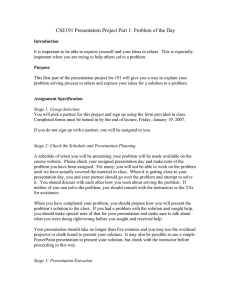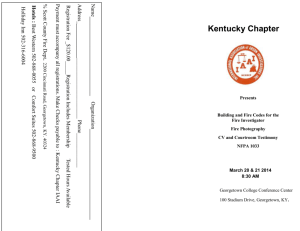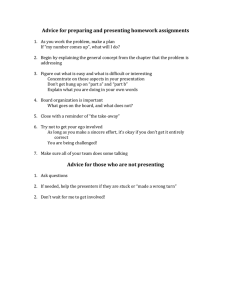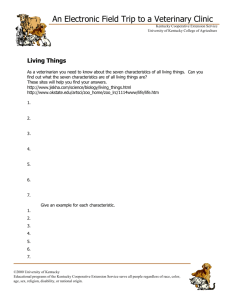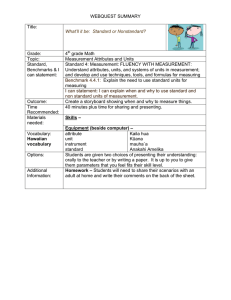Research Focus
advertisement
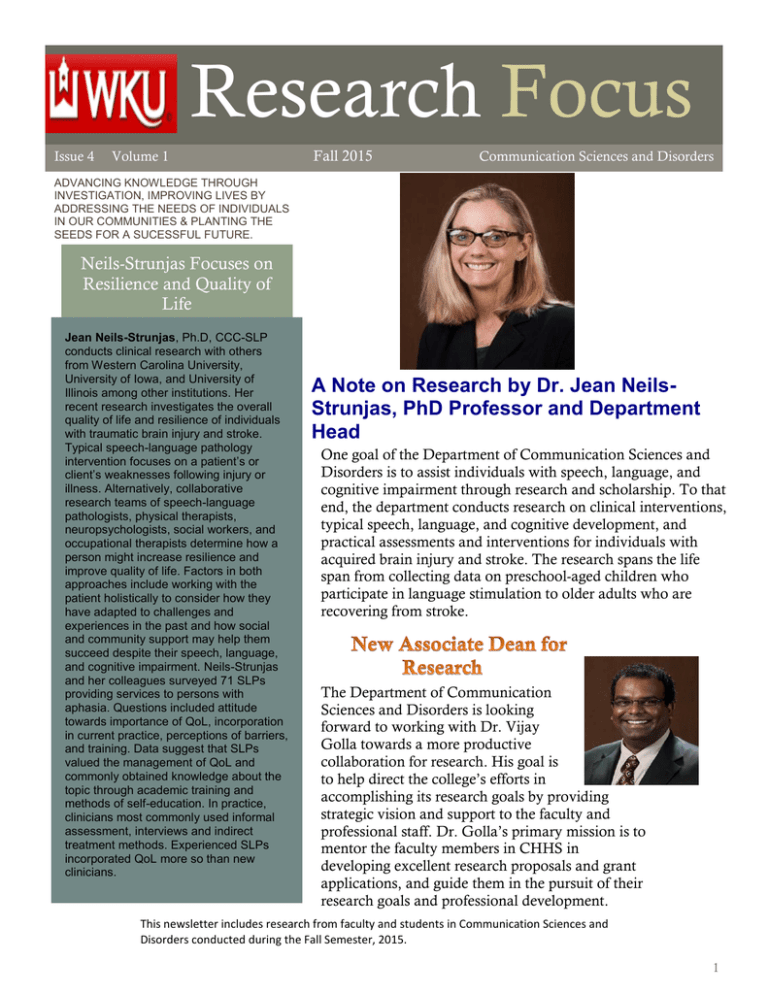
Research Focus Issue 4 Volume 1 Fall 2015 Communication Sciences and Disorders ADVANCING KNOWLEDGE THROUGH INVESTIGATION, IMPROVING LIVES BY ADDRESSING THE NEEDS OF INDIVIDUALS IN OUR COMMUNITIES & PLANTING THE SEEDS FOR A SUCESSFUL FUTURE. Neils-Strunjas Focuses on Resilience and Quality of Life Jean Neils-Strunjas, Ph.D, CCC-SLP conducts clinical research with others from Western Carolina University, University of Iowa, and University of Illinois among other institutions. Her recent research investigates the overall quality of life and resilience of individuals with traumatic brain injury and stroke. Typical speech-language pathology intervention focuses on a patient’s or client’s weaknesses following injury or illness. Alternatively, collaborative research teams of speech-language pathologists, physical therapists, neuropsychologists, social workers, and occupational therapists determine how a person might increase resilience and improve quality of life. Factors in both approaches include working with the patient holistically to consider how they have adapted to challenges and experiences in the past and how social and community support may help them succeed despite their speech, language, and cognitive impairment. Neils-Strunjas and her colleagues surveyed 71 SLPs providing services to persons with aphasia. Questions included attitude towards importance of QoL, incorporation in current practice, perceptions of barriers, and training. Data suggest that SLPs valued the management of QoL and commonly obtained knowledge about the topic through academic training and methods of self-education. In practice, clinicians most commonly used informal assessment, interviews and indirect treatment methods. Experienced SLPs incorporated QoL more so than new clinicians. A Note on Research by Dr. Jean NeilsStrunjas, PhD Professor and Department Head One goal of the Department of Communication Sciences and Disorders is to assist individuals with speech, language, and cognitive impairment through research and scholarship. To that end, the department conducts research on clinical interventions, typical speech, language, and cognitive development, and practical assessments and interventions for individuals with acquired brain injury and stroke. The research spans the life span from collecting data on preschool-aged children who participate in language stimulation to older adults who are recovering from stroke. The Department of Communication Sciences and Disorders is looking forward to working with Dr. Vijay Golla towards a more productive collaboration for research. His goal is to help direct the college’s efforts in accomplishing its research goals by providing strategic vision and support to the faculty and professional staff. Dr. Golla’s primary mission is to mentor the faculty members in CHHS in developing excellent research proposals and grant applications, and guide them in the pursuit of their research goals and professional development. This newsletter includes research from faculty and students in Communication Sciences and Disorders conducted during the Fall Semester, 2015. 1 Issue 4 Volume 1 Fall 2015 Collaborative Learning in Distance Learning Courses Lauren Bland, Ph.D, Barbara Brindle, Ph.D, Richard Dressler, Ph.D, Jo Shackelford, Ed.D, Kimberly Green, Ed.D, and Allison Hatcher, M.S. Working in collaborative groups is an essential part of many CSD classrooms. Faculty instructors build experiences for students that mirror teamwork needed on the job. This research team studied effective group strategies, methods to assess learning, and ways to involve students in the development of group projects in distance education. Participants at ASHA 2015 shared their successful group work strategies. CEU ASHA Approved Provider The Department of Communication Sciences and Disorders was recently approved to offer continuing education through the American Speech-LanguageHearing Association. The department recently held a workshop and more than 95 speech-language pathologists’ professionals attended. The workshop was designed to help practicing SLPs continue their skill development and service. WKU instructors and community supervisors led sessions on dealing with managing caseloads and ethics & supervision. Communication Sciences and Disorders ASHA 2015 Presenters Title: Effects of Concussive Blast Injuries on a Test of Problem Solving Presenter(s): Richard Dressler Western Kentucky U (presenting author); Robert Marshall U of Kentucky Title: The Role of Resilience in the Rehab of Adults With Acquired Brain Injury Presenter(s): Jean Neils-Strunjas Western Kentucky U (presenting author); Kathleen Bechtold Johns Hopkins; Allison Clark Baylor Coll of Medicine; Kacey Maestas Baylor Coll; Raksha Mudar U of Illinois; Melissa Duff U of Iowa (presenting author); Brigid Waldron-Perrine Rehab Inst of Michigan; Diane Paul ASHA (presenting author) Title: Clinical Measure of Problem Solving in Typical Children & Implications for Use With Children With Autism Presenter(s): Janice Carter Smith Western Kentucky U (presenting author); Robert Marshall U of Kentucky Title: What Speech-Language Pathologists Report About Management of Quality of Life in Aphasia: A Pilot Study Presenter(s): K. Leigh Morrow-Odom Western Carolina U (presenting author); Dana Moser U of New Hampshire (presenting author); Jean Neils-Strunjas Western Kentucky U (presenting author) Title: Strategies for Ethics Education: Preparing Graduate Students for Clinical Placements in Diverse Settings Presenter(s): Carol Cannon Jackson Pub Schs (presenting author); Lauren Bland Western Kentucky U (presenting author) Title: Developing a Needs Assessment Tool for an Intensive Aphasia Program Presenter(s): Dalana Henson Western Kentucky U (presenting author); Abigail Leofsky Western Kentucky U (presenting author); Jo Shackelford Western Kentucky U (presenting author) Title: Collaborative Learning in Distance Learning: Making Group Assignments Engaging, Effective, & Educational Presenter(s): Lauren Bland Western Kentucky U (presenting author); Richard Dressler Western Kentucky U (presenting author); Barbara Brindle Western Kentucky U (presenting author); Jo Shackelford Western Kentucky U (presenting author); Kimberly Green Western Kentucky U (presenting author); Allison Hatcher Western Kentucky U (presenting author) Title: Looking Beyond the Rehab Team: Interprofessional Education With First Responders Presenter(s): Jo Shackelford Western Kentucky U (presenting author) Title: Ethical Decision-Making: Student & Professional Perspectives Presenter(s): Rose Allen Missouri St U; Lauren Bland Western Kentucky U (presenting author); Todd Daniel Missouri St U; Alana Kennedy Missouri St U Title: More Than Mommy & Me: Parent-Based Language Intervention Using Small Groups Presenter(s): Courtney Hatcher Western Kentucky U (presenting author); Caroline Hudson Western Kentucky U (presenting author) 2 Issue 4 Volume 1 Fall 2015 Communication Sciences and Disorders Parents’ Perspectives on Transitioning to Preschool Allison Hatcher, M.S. and Caroline Hudson, M.S. Effects of Concussive Blast Injuries on a Test of Problem Solving Richard Dressler, Ph.D. and Robert Marshall, Ph.D., reported on the results of the effects of brain damage due to concussive blast injuries on a test of problem solving. The research presented the results of a study involving service members who were exposed to blasts during the Gulf War and their scores on a test of problem solving. The Rapid Assessment of Problem Solving (RAPS) examination was used to evaluate executive function of participants who have suffered concussive blast injuries. Test results were compared between participants who suffered concussive blast-related injuries (CBRI) with those who have a history of CBRI and post-traumatic stress syndrome (PTSD). Janice Smith, Ph.D, recently conducted a study to examine performance and to establish a normative database for The Rapid Assessment of Problem Solving (RAPS) with typically developing (TD) children. Participants were 229 TD children (109 males and 120 females) between the ages of 7:0 to 17.11 years. Participants completed a screening and RAPS. Scores were calculated for percent of constraint questions, integration planning, and question efficiency. Data was also examined for question type, strategy selection and strategy shift. ANOVAs confirmed that young children ask fewer constraint questions than the older groups (p <0.0001) and score significantly lower in both question asking efficiency (p <0.0001) and integration planning (preadolescent p = 0.0006; adolescent p < 0.0001). However, ANOVA results failed to support differences in problem efficiency scores for each of the three groups (p = 0.68) indicating an absence of learning effects. A Fisher’s Exact Test showed groups approaching significance (p = 0.07) for distribution of strategy types with young children preferring guessing or mixed strategies. Preliminary statistical evidence indicates the RAPS test has the potential to reliably assess problem solving ability in a wide range of TD children. Allison Hatcher (P.I.) and Caroline Hudson are currently examining the perspectives of parents’ whose child is transitioning to preschool. The purpose of this qualitative research study using a phenomenology approach is to explore the perceptions of parents of preschoolers who are transitioning their child to preschool. Parent perspectives are being investigated by interviewing parents after participating in the Little Topper Time (LTT) program during the summer of 2015. Investigators are exploring what parents report about their experiences and feelings associated with transitioning their child to preschool as well as parents’ perceptions about the various components of the LTT program. The researchers hope to improve the LTT program at WKU and also learn more about how to support parents during the transition-topreschool phase. Ball, A., Neils-Strunjas, J., & Krival, K. (2015). A longitudinal posthumous study of letter writing in a late elderly case. American Speech and Hearing Association’s Perspectives- SIG 15 (Gerontology). Shackelford, J.L., & Nale, S. (in press). Training police officers to differentiate traumatic brain injury from alcohol intoxication. Contemporary Issues in Communication Science and Disorders. Evans, C., & Shackelford, J.L. (2015). Course of action is defined by juridical field in a case study of young professionals. International Journal of Liberal Arts and Social Science, 3(2), 15-27. 3 Issue 4 Volume 1 Fall 2015 Communication Sciences and Disorders CSD Students Graduate student, Dalana Henson and undergraduate student, Abigail Leofsky presented in Denver, CO at ASHA 2015. Their poster reviewed factors related to the potential to develop an intensive aphasia program at WKU. The development of the research was enhanced through the creation of a Needs Assessment tool for the persons with aphasia (PWA). Research regarding self-report measures for PWA including best practice for aphasia-friendly survey design and proxy report was utilized and applied to tool development. They were awarded research funding from WKU. Pictured from left to right: Dalana Henson, B.S. and Abigail Leofsky ASHA Experience: “ASHA was a wonderful opportunity for me to gain presentation experience and talk about my research project. The opportunity to discuss the project with professionals allowed me to gain new insights regarding my project. I was also very excited to talk with experts whom I have cited in my research! I attended several sessions at ASHA that allowed me to learn about new research in the field and further develop my knowledge base. The exhibits at ASHA were also a lot of fun and I was able to learn about products that I am eager to use in future therapy sessions.” Dalana Henson, Second Year Graduate Student Undergraduate, Kelly Fussman, developed and taught a five-day English language skills seminar series for a group of 12 international students, focusing on pronunciation, grammar, vocabulary, social language, and acculturation. As evidenced by pre- and post-assessment results and course evaluations, the seminar series was very effective in improving both the students’ speech and language skills and cultural competency. Participants also noted an increase in their confidence level when communicating in English. These results highlight the need for quality language and cultural education programs for international students in order for them to be more successful while studying abroad. Faculty, please encourage your students to get involved with REACH week activities in the Spring! For more information go to http://www.wku.edu/research/celebrate.php . Kelly looks forward to presenting the outcomes of this project at the Kentucky Speech-Language-Hearing Association's (KSHA) Annual Convention on February 18, 2016, as well as at The University of Alabama's Annual Languages Conference on February 13, 2016. She would like thank her advisors, Dr. Mary Lloyd Moore and Dr. Suguna Mukthyala, for their constant support and the WKU Office of Academic Affairs and Office of Research for awarding her the FacultyUndergraduate Student Engagement (FUSE) Grant to carry out her research. 4
